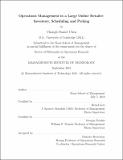Operations management in a large online retailer : inventory, scheduling and picking
Author(s)
Chen, Chongli Daniel
DownloadFull printable version (4.523Mb)
Other Contributors
Massachusetts Institute of Technology. Operations Research Center.
Advisor
Retsef Levi and Georgia Perakis.
Terms of use
Metadata
Show full item recordAbstract
Online retail has grown rapidly in the last decade. Consumers enjoy the convenience of online shopping and home delivery, as well as a vast product assortment. From the business perspective, serving customers directly from warehouses reduces investment needed in physical storefronts. In this thesis, we consider operations management problems that are important to the effective and efficient operations in the warehouse of a large online retailer. We first consider the decision of stocking inventory in the warehouse, for products in the long tail of the online retail assortment. Motivated by real world business practice, we assume the underlying demand distribution is a mixture of known distributions, but with unknown weights. We propose a robust optimization model to decide on inventory levels given a few samples of demand, outperforming standard robust optimization methods in the relevant settings. The next two models are motivated by our collaboration with a large online retailer that operates multiple warehouses. We study a setting in which a warehouse has to fulfill a sequence of orders, each including multiple items. Pickers pick items in batches, and partially completed orders take up space on a sorting area called the wall. This gives rise to a fundamental tradeoff between picking efficiency and sorting efficiency. We propose a batch scheduling model, generalizing existing models by allowing for more general batch processing time functions, as well as incorporating an objective related to multi-item orders. We show hardness results, and propose both approximation algorithms and Integer Programming formulations. Finally, we build a simulation of the warehouse picking process, using data from a large online retailer. We propose a picking policy that better balances the tradeoff between picking and sorting efficiency, achieving a 42% decrease in average wall utilization and a 60% decrease in average order cycle time. We propose a model allowing us to analyze the tradeoffs between two heuristic policies representing the current policy and our proposed policy, and characterize a condition under which our proposed policy makes a small sacrifice in picking efficiency in return for a larger increase in sorting efficiency. This explains the empirical success of our policy.
Description
Thesis: Ph. D., Massachusetts Institute of Technology, Sloan School of Management, Operations Research Center, 2018. This electronic version was submitted by the student author. The certified thesis is available in the Institute Archives and Special Collections. Cataloged from student-submitted PDF version of thesis. Includes bibliographical references (pages 187-191).
Date issued
2018Department
Massachusetts Institute of Technology. Operations Research Center; Sloan School of ManagementPublisher
Massachusetts Institute of Technology
Keywords
Operations Research Center.